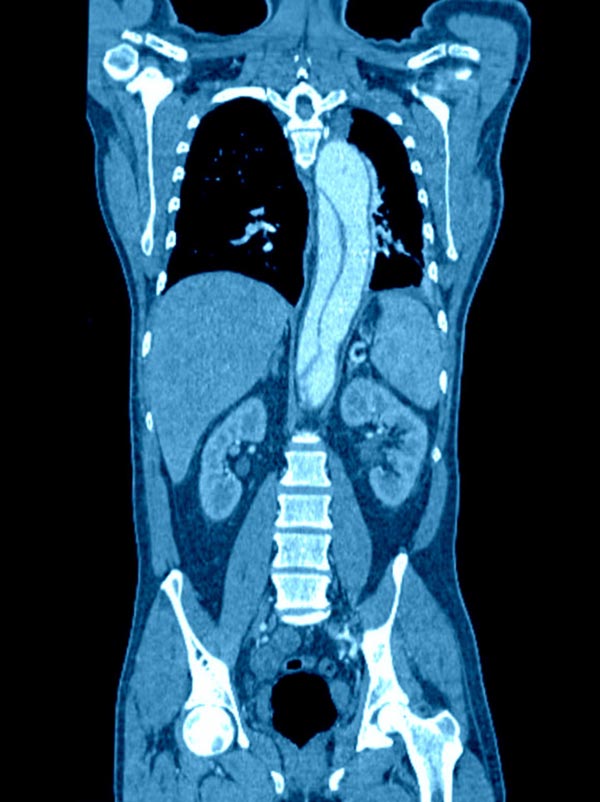IV contrast for CT is not associated with increased risk of acute kidney injury

A new study in Annals of Emergency Medicine finds no association between intravenous contrast media used in computed tomography (CT) and kidney damage. Roughly 80 million doses of IV contrast media are given every year. Credit: American College of Emergency Physicians
“Over 80 million doses of IV contrast media are administered every year, and in the emergency department it can be essential to accurately diagnose certain acute critical conditions,” said lead study author Jeremiah Hinson, MD, PhD, of Johns Hopkins University School of Medicine in Baltimore, Md.
“But physicians have had concerns that the contrast media causes serious kidney problems later on, with some studies showing contrast-induced nephropathy occurring in as many as 14 percent of patients receiving it.
However, studies used to establish this risk were performed prior to the development of modern contrast reagents or without adequate controls. Using a controlled design in current context, we could not find an association between intravenous contrast media use and acute kidney injury.”
Researchers studied five years of records for patients receiving CT with or without contrast-enhancement in the emergency department. Of all CT scans, 57.2 percent were contrast-enhanced. The probability of developing acute kidney injury was 6.8 percent for patients undergoing contrast-enhanced CT, 8.9 percent for patients receiving unenhanced CT and 8.1 percent for patients not receiving CT at all.
“While a well-controlled randomized prospective study is required to fully determine the contribution of intravenous contrast media to the development of acute kidney injury, our results clearly demonstrate that in emergency departments such as ours where practice patterns have evolved to protect patients' kidneys, contrast media is not associated with increased risk of kidney injury,” said Dr. Hinson.
“Our data also suggest that in cases where contrast-enhanced CT is indicated to avoid delayed or missed diagnosis of critical disease, the potential morbidity and mortality resulting from a failure to diagnose potentially life-threatening conditions likely outweigh any potential risk of kidney injury.
###
Annals of Emergency Medicine is the peer-reviewed scientific journal for the American College of Emergency Physicians, the national medical society representing emergency medicine. ACEP is committed to advancing emergency care through continuing education, research, and public education. Headquartered in Dallas, Texas, ACEP has 53 chapters representing each state, as well as Puerto Rico and the District of Columbia. A Government Services Chapter represents emergency physicians employed by military branches and other government agencies. For more information, visit http://www.
Media Contact
All latest news from the category: Health and Medicine
This subject area encompasses research and studies in the field of human medicine.
Among the wide-ranging list of topics covered here are anesthesiology, anatomy, surgery, human genetics, hygiene and environmental medicine, internal medicine, neurology, pharmacology, physiology, urology and dental medicine.
Newest articles

Machine learning algorithm reveals long-theorized glass phase in crystal
Scientists have found evidence of an elusive, glassy phase of matter that emerges when a crystal’s perfect internal pattern is disrupted. X-ray technology and machine learning converge to shed light…

Mapping plant functional diversity from space
HKU ecologists revolutionize ecosystem monitoring with novel field-satellite integration. An international team of researchers, led by Professor Jin WU from the School of Biological Sciences at The University of Hong…

Inverters with constant full load capability
…enable an increase in the performance of electric drives. Overheating components significantly limit the performance of drivetrains in electric vehicles. Inverters in particular are subject to a high thermal load,…





















